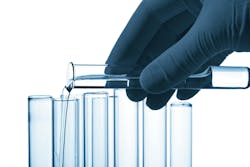Researchers use E. coli to detect heavy metals in water
The University of California, Irvine (UCI) announced that new research has demonstrated that E. coli has value as part of a system to detect heavy metal contamination in water.
E. coli exhibit a biochemical response in the presence of metal ions, a slight change that researchers were able to observe with chemically assembled gold nanoparticle optical sensors.
The process, which the researchers said can be accomplished in about 10 minutes, is the subject of a study appearing in Proceedings of the National Academy of Sciences.
“This new water monitoring method developed by UCI researchers is highly sensitive, fast and versatile,” said co-author Regina Ragan, UCI professor of materials science and engineering. “It can be broadly deployed to monitor toxins at their sources in drinking and irrigation water and in agricultural and industrial runoff. This system can provide an early warning of heavy metal contamination to safeguard human health and ecosystems.”
In the study, the scientists explained that they can apply trained algorithms to unseen tap water and wastewater samples, which means the system can be generalized to water sources and supplies anywhere in the world.
“This transfer learning method allowed the algorithms to determine if drinking water was within U.S. Environmental Protection Agency and World Health Organization recommend limits for each contaminant with greater than 96-percent accuracy and with 92-percent accuracy for treated wastewater,” Ragan said.
“Access to safe water is necessary for the health of people and the planet,” she added. “New technology that can be mass manufactured at low-cost is needed to monitor the introduction of an array of contaminants in the water supply as a critical part of the solution for water security in the face of pollution and climate change.”
